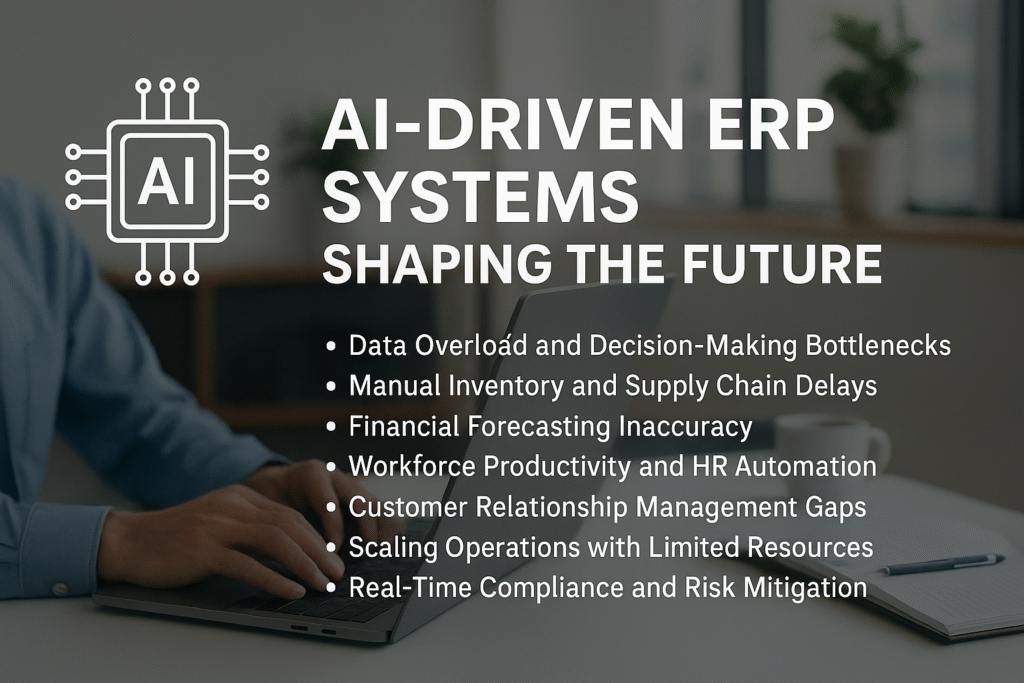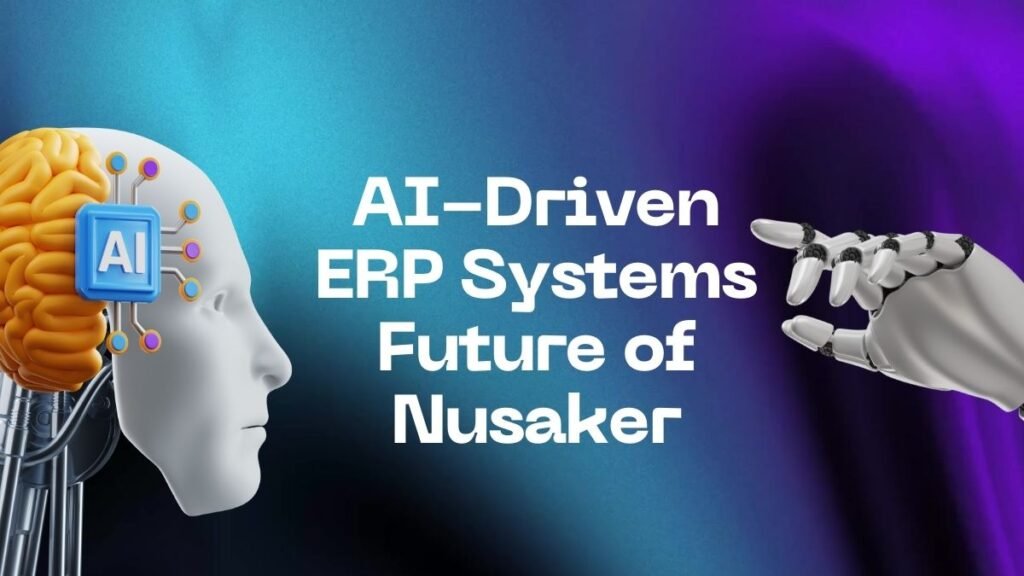Today, running a business isn’t just about selling products or offering services. It’s about staying sharp, moving fast, and making decisions with confidence. That’s where AI-driven ERP systems come in. These smart tools blend artificial intelligence with business software to make everything smoother—from managing inventory to predicting profits. As we move into a tech-driven future, companies are turning to these systems to stay ahead of the game.
AI and ERP used to live in separate worlds. Now, they work side by side to solve modern business problems. Whether it’s cutting down delays, improving forecasting, or helping teams work together better, AI-powered ERP software is becoming a game changer for businesses of all sizes.
The Modern Challenges Faced by Growing Enterprises
Outdated Systems and Siloed Information
Many businesses still use old tools that don’t talk to each other. Sales, finance, and operations all have their own systems. This makes it hard to see the big picture and leads to slow decisions.
Difficulty in Real-Time Decision-Making
When data comes in late or is incomplete, making smart decisions gets tricky. Real-time insights are key, but many traditional systems can’t keep up.
Costly Manual Processes and Human Errors
Manual entry wastes time and often leads to mistakes. This slows down the workflow and hurts the bottom line. When you’re growing, these problems grow too.
How AI-Driven ERP Systems Offer Smart Solutions
Unified Dashboards for Smarter Collaboration
AI ERP platforms bring everything together. Instead of jumping between programs, teams can work from one dashboard. This helps people stay on the same page and make faster choices.
Predictive Analytics for Future-Proof Decisions
With AI-based analytics, businesses can now look ahead. These tools study trends and patterns to show what might happen next. This helps leaders plan for demand, avoid losses, and spot growth areas.
Automated Workflows That Cut Time and Cost
No more manual tasks. AI automates jobs like scheduling, reporting, and invoicing. That means fewer errors, faster work, and more time for big-picture thinking.

Transforming Key Business Functions with AI-ERP
Intelligent Supply Chain and Inventory Management
AI watches stock levels in real-time and even places restock orders automatically. It tracks supplier delays and adjusts delivery dates to keep things on schedule.
AI in Financial Forecasting and Budget Planning
No more guessing. AI-powered ERP tools use past spending and current market trends to forecast future numbers. This helps businesses budget smarter and avoid overspending.
AI-Powered HR for Smarter Talent Management
Hiring and managing people gets easier with AI. It scans resumes, tracks performance, and even suggests training. This helps build stronger teams faster.
The Future of Business Operations with AI-ERP Integration
Real-Time Reporting and Compliance Made Simple
Need a report now? AI makes it happen. It pulls real-time data and shows it in clear visuals. This also helps companies stay on top of taxes, laws, and compliance rules.
Adaptive Systems That Learn and Grow with You
AI doesn’t just follow rules—it learns. As your business changes, AI learns what works and what doesn’t. This makes the ERP system smarter over time.
Sustainable Scaling for Small and Medium Enterprises
AI ERP systems grow with your business. You don’t need to replace them every time you expand. That saves money and makes the growth process smoother.
Real-World Use Cases: Where AI-ERP Makes an Impact
AI in E-commerce Back-End Efficiency
E-commerce platforms are using AI ERP to manage orders, customer data, and shipping—all in one place. This makes shopping faster and smoother for buyers.
AI ERP in Manufacturing and Production Flow
Factories use AI to track machines, spot issues early, and improve output. It also helps manage materials so there’s no waste.
AI for Cross-Border Business Management
Going global? AI handles exchange rates, international taxes, and different time zones. That makes it easier to run a business across countries.
Is Your Business Ready for AI ERP? Key Considerations
What to Look for in an AI ERP Platform
Look for a system that matches your size and needs. Make sure it offers cloud access, real-time updates, and good support. Integration with your existing tools is a big plus.
Implementation Roadmap for Future-Ready Systems
Start small. Roll out the system in phases. Train your team and track progress. Choose one area to automate first—like accounting or HR—and build from there.
Common Pitfalls to Avoid When Upgrading
Don’t rush the process. Skipping training or setup steps can lead to failure. Also, don’t pick a system based just on price—focus on value and scalability.
Conclusion: AI ERP Is Not Just a Tool, It’s a Business Partner
Smart, fast, and always learning—AI-driven ERP systems are becoming the heart of modern businesses. They cut down waste, connect teams, and help leaders make better decisions. Whether you’re running a startup or managing a large company, this tech can take your business to the next level.
The future isn’t just digital. It’s intelligent, real-time, and adaptive. AI ERP isn’t something for tomorrow. It’s here now—and it’s ready to grow with you.

